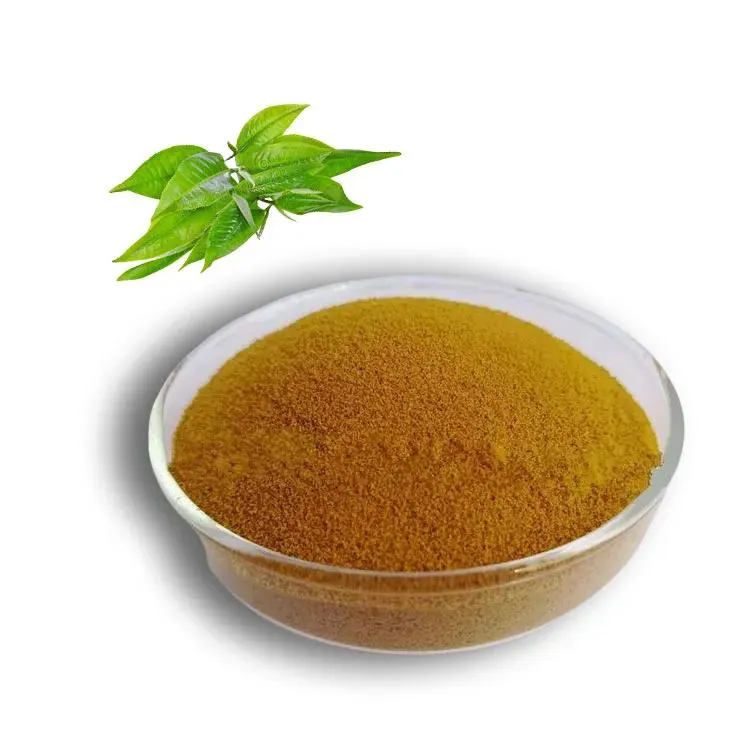- 0086-571-85302990
- sales@greenskybio.com
Certified organic green tea extract.
2024-12-02

1. Introduction to Certified Organic Green Tea Extract
Certified organic Green Tea Extract is a highly prized and versatile substance in today's market. The term "certified organic" is of utmost importance as it ensures that the green tea used for extraction has been cultivated in strict accordance with organic farming standards. These standards typically involve the use of natural fertilizers, absence of synthetic pesticides and herbicides, and sustainable farming practices. Green tea, in its natural form, has been consumed for centuries in many Asian cultures, renowned for its health - promoting properties. The extraction process concentrates these beneficial components, making it a convenient and potent form for various applications.

2. Bioactive Compounds in Green Tea Extract
Green tea extract is rich in a plethora of bioactive compounds, with EGCG (epigallocatechin - 3 - gallate) being one of the most well - known and studied. EGCG is a type of catechin, a class of polyphenols that are abundant in green tea.
2.1 EGCG and Its Significance
EGCG has been the focus of numerous scientific research studies due to its remarkable properties. It is a powerful antioxidant, which means it can scavenge free radicals in the body. Free radicals are unstable molecules that can cause damage to cells, proteins, and DNA, and are associated with various diseases and the aging process. By neutralizing these free radicals, EGCG helps to protect the body's cells and maintain their normal function.
2.2 Other Bioactive Compounds
In addition to EGCG, green tea extract also contains other catechins such as epicatechin, epicatechin - 3 - gallate, and gallocatechin - 3 - gallate. These compounds work together synergistically to provide the overall health benefits associated with green tea extract. There are also flavonoids, amino acids like L - theanine, and various minerals present in green tea extract. The amino acid L - theanine is known for its relaxing and stress - relieving properties. It can cross the blood - brain barrier and has an impact on neurotransmitter levels, promoting a sense of calmness while also enhancing cognitive function.

3. Health Benefits of Certified Organic Green Tea Extract
3.1 Cognitive Function Enhancement
The combination of compounds in green tea extract, especially EGCG and L - theanine, has been shown to have a positive impact on cognitive function. Studies have suggested that regular consumption of green tea or its extract can improve memory, attention, and concentration. It may also reduce the risk of cognitive decline associated with aging, such as in conditions like Alzheimer's and dementia. The antioxidant properties of green tea extract help to protect the brain cells from oxidative stress, which is a major contributor to neurodegenerative diseases.
3.2 Immune System Support
Green tea extract can play a significant role in supporting the immune system. The antioxidants present in it help to strengthen the body's defense mechanisms. They can enhance the function of immune cells, such as white blood cells, which are responsible for fighting off infections and diseases. Additionally, the anti - inflammatory properties of green tea extract can help to reduce chronic inflammation in the body, which is often associated with a weakened immune system. By maintaining a healthy balance of inflammation, the immune system can function more effectively.
3.3 Anti - Cancer Properties
One of the most promising areas of research regarding green tea extract is its potential anti - cancer properties. Although more research is still needed, in vitro and some in vivo studies have shown that EGCG and other components of green tea extract can inhibit the growth and spread of cancer cells. They can interfere with the signaling pathways that are involved in cancer cell proliferation, apoptosis (programmed cell death), and angiogenesis (the formation of new blood vessels that supply tumors). However, it is important to note that green tea extract should not be considered a sole treatment for cancer, but rather a complementary approach in the overall prevention and management of the disease.

4. Applications in the Cosmetic Industry
Certified organic green tea extract has found wide - ranging applications in the cosmetic industry. Its skin - improving qualities make it a popular ingredient in many skincare products.
4.1 Reducing Wrinkles
The antioxidant properties of green tea extract are highly beneficial for reducing wrinkles. As mentioned earlier, it can combat free radicals that cause damage to the skin cells. This damage is one of the main causes of premature aging and the formation of wrinkles. By neutralizing these free radicals, green tea extract helps to keep the skin cells healthy and youthful - looking. It can also stimulate the production of collagen, a protein that is essential for maintaining the skin's elasticity and firmness. As we age, collagen production naturally declines, leading to sagging skin and wrinkles. Green tea extract can help to slow down this process and improve the overall texture of the skin.
4.2 Enhancing Skin Elasticity
Green tea extract contains compounds that can enhance skin elasticity. Collagen and elastin are two important proteins in the skin that are responsible for its elasticity. Green tea extract can promote the synthesis of these proteins, thereby making the skin more supple and resilient. It also has anti - inflammatory properties, which can reduce skin redness and irritation. This is especially useful for those with sensitive skin or skin conditions such as eczema or rosacea. By reducing inflammation, green tea extract can help to soothe the skin and improve its overall appearance.
5. How to Incorporate Certified Organic Green Tea Extract into Your Routine
5.1 Dietary Consumption
One of the easiest ways to obtain the benefits of certified organic green tea extract is through dietary consumption. This can be achieved by drinking green tea regularly. Green tea is available in various forms, such as loose - leaf tea, tea bags, or as a ready - to - drink beverage. However, if you prefer a more concentrated form, green tea extract supplements are also available in the market. When choosing a supplement, it is important to ensure that it is from a reliable source and is certified organic. It is also advisable to follow the recommended dosage instructions provided by the manufacturer.
5.2 Cosmetic Use
To enjoy the skin - benefits of green tea extract, look for skincare products that contain this ingredient. There are a wide variety of products available, including moisturizers, serums, face masks, and eye creams. When using these products, it is important to follow the application instructions provided. Generally, it is recommended to cleanse the skin thoroughly before applying the product and to use it regularly for the best results.
6. Conclusion
Certified organic green tea extract is a truly remarkable substance with a wide range of health and cosmetic benefits. Its bioactive compounds, such as EGCG and L - theanine, contribute to its effectiveness in promoting cognitive function, supporting the immune system, and potentially having anti - cancer properties. In the cosmetic industry, it has proven to be a valuable ingredient for improving skin health. Whether through dietary consumption or cosmetic use, incorporating green tea extract into your routine can be a great way to enhance your overall well - being. However, it is always important to consult with a healthcare professional or a dermatologist, especially if you have any underlying health conditions or are taking other medications, to ensure its safe and appropriate use.
FAQ:
What are the main bioactive compounds in certified organic green tea extract?
The main bioactive compound in certified organic green tea extract is EGCG (epigallocatechin - 3 - gallate). However, it also contains other bioactive substances that contribute to its multiple benefits.
How does certified organic green tea extract enhance cognitive function?
The bioactive compounds in the green tea extract, such as EGCG, may have antioxidant and anti - inflammatory effects in the brain. This can help protect neurons from damage, improve neurotransmitter function, and thus enhance cognitive function.
Can certified organic green tea extract really prevent cancer?
While some studies suggest that the bioactive compounds in green tea extract, like EGCG, may have anti - cancer properties in laboratory and some epidemiological studies, more research is needed to firmly establish its role in cancer prevention in humans.
What makes certified organic green tea extract beneficial for skin?
The compounds in the green tea extract can have antioxidant effects on the skin. This helps in reducing oxidative stress, which is associated with aging. It can reduce wrinkles and enhance skin elasticity.
How is the green tea for extraction grown to meet the organic certification?
Green tea for certified organic green tea extract is grown following strict organic standards. This typically includes avoiding the use of synthetic pesticides, fertilizers, and genetically modified organisms, and following sustainable farming practices.
Related literature
- The Health Benefits of Organic Green Tea Extract"
- "Bioactive Compounds in Green Tea Extract: Properties and Applications"
- "Organic Green Tea Extract in Cosmetics: A Review"
- ▶ Hesperidin
- ▶ Citrus Bioflavonoids
- ▶ Plant Extract
- ▶ lycopene
- ▶ Diosmin
- ▶ Grape seed extract
- ▶ Sea buckthorn Juice Powder
- ▶ Fruit Juice Powder
- ▶ Hops Extract
- ▶ Artichoke Extract
- ▶ Mushroom extract
- ▶ Astaxanthin
- ▶ Green Tea Extract
- ▶ Curcumin
- ▶ Horse Chestnut Extract
- ▶ Other Product
- ▶ Boswellia Serrata Extract
- ▶ Resveratrol
- ▶ Marigold Extract
- ▶ Grape Leaf Extract
- ▶ New Product
- ▶ Aminolevulinic acid
- ▶ Cranberry Extract
- ▶ Red Yeast Rice
- ▶ Red Wine Extract
-
Epimedium extract powder
2024-12-02
-
Tinospora cordifolia extract
2024-12-02
-
Rosemary extract
2024-12-02
-
Saponin Extract
2024-12-02
-
Curcumin Extract
2024-12-02
-
Mulberry Extract
2024-12-02
-
Andrographis Paniculata Extract Powder
2024-12-02
-
Medicinal Marshmallow Extract
2024-12-02
-
Jujube Extract
2024-12-02
-
Buckthorn bark extract
2024-12-02





















